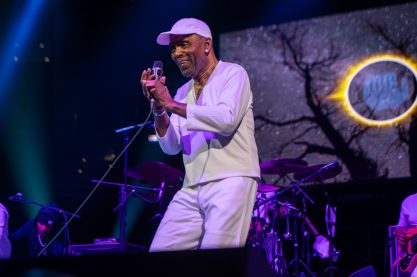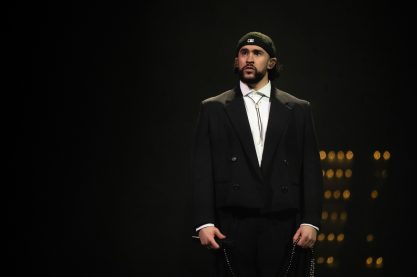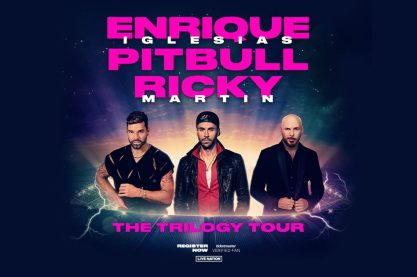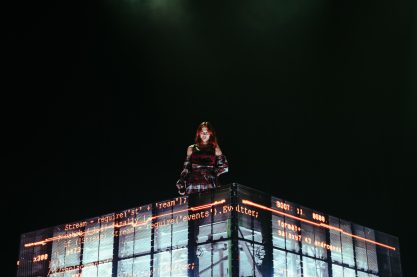Music
TALK: "The Box that Rocks" Ralph McDaniels discusses Video Music Box
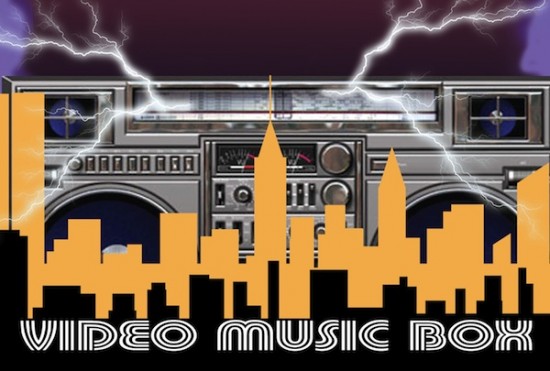
From our latest contributor, Tarynn Farmer.
I vaguely knew Video Music Box existed before I sat down anxiously waiting for the panel discussion to begin. As I looked around, I realized that I was sitting in the middle of history. THE BOX ROCKS: 30 Years of Video Music Box and the Rise of Hip Hop Music & Culture is an exhibition at MoCADA that celebrates the influence of Video Music Box and its historic contribution to urban culture. Guest curated by Dexter Wimberly the exhibit will end on May 28, 2012.
In 1983, Ralph McDaniels created Video Music Box to embrace a new art form: music videos. This innovative show was one of the first television programs to feature Hip Hop music videos primarily. At the time, hip hop videos were rarely seen on television. Video Music Box aired on public access television which was accessible to almost everyone. The inner city youth was able to relate because they saw themselves. VMB promoted not only creativity but unity, anti-violence and anti-drug use.
Each exhibiting artist started to take their seat as the mic slowly raised to Dexter Wimberly's mouth. Immediately, I was enamored by the conversation between Wimberly, Malik Y. Cumbo, Delphine Fawundu, Bobbito Garcia, Tahir Hemphill, Ali Santana, and Ralph McDaniels as they discussed Video Music Box, Hip Hop, and it's culture.
Hip Hop Today - Love/Hate
"What's your relationship with Hip Hop today?" asked Dexter Wimberly. Hip Hop isn't the same. Radio today is driven by corporate partners rather than the heart of the DJ and their listeners. It's obvious that the stations are very focused on getting to the next commercial that music is barely used. We hear more commercials on the radio today than ever before. If there isn't a commercial, there's a bull horn or a DJ interjecting at every downbeat. As listeners, we've become passive - taking what is given to us and not asking for more. For many music lovers, Hip Hop today is only a fraction of the art form it used to be.
Ralph McDaniels was once told that he couldn't play music videos by Big Sean, Lil Wayne followed by Big Daddy Kane and KRS-ONE. His rebuttal was, "Why not? You never know who's watching or listening. This could be the first time that they've heard of Big Daddy Kane." McDaniels fearlessly questions the corporate template and writes his own rules. We shouldn't wait for Throwback Thursdays on the radio to listen to old hip hop. There are so many young people that think Lil Wayne is the best rapper alive. Don't get me wrong - Lil Wayne is a very talented. However, I feel that people would respect the current state of hip hop even more if they knew and heard the history.
I think its safe to say that many of us have experienced nostalgic conversations of when MTV and BET used to play videos. There is a sweet magic about Video Music Box. Ralph reminisces about a time a 16-year-old told him "I like your show - you actually play whole music videos." The simple fact that Video Music Box plays the full-length of the video only adds to the magic.
Dexter and Delphine talk about a time when you were able to be so close to Hip Hop. They talked about a time where they worked on a project together with The Fugees before "The Score" was released. The trio jumped out of a Toyota Camry in Brooklyn Heights to take photos and talk about music. No Escalades, no entourage, no egos, and no paparazzi. I guess it was easier back then. Nowadays, everyone is connected to a social media network with their mobile devices that any picture will be searchable on the Internet.
Hip Hop artists are featured in a Maybach or Maserati wearing flashy jewelry with a "beautiful" girl in the passenger seat. Not every artist has this luxury but they risk their finances to put on a show. Any picture of an Hip Hop artist that is out of character is a potential downfall to their career. The technology has evolved in ways that entertainers are forced to play a character at all times. Young people have trouble separating reality and fantasy. As a result, hyper violent and hyper materialistic personas are becoming role models.
Tahir Hemphill's thought provoking piece in the exhibit combines Hip Hop and statistics. His interactive infographic, "Champagne Always Stains My Silk," visualizes all the mentions of champagne by US rappers from the 1980-2010. The results are dramatic as it compares location of the rapper and the brand of champagne. Immediately, I thought about the public downfall of the mentions of Cristal after Jay Z cut ties with the brand. After all, this is a business. The simple product placement in a music video or a song can increase your business exponentially. Malik and Ali mentioned the use of gold chains and how it increased crime in the 90's. You had to have jewelry to express your worth. If you didn't have the money, you found a way to get gold chains. This only added to the hyper materialistic and hyper violent nature of our youth.
Delphine brought up a great point about hip hop today and it's image of women. A majority of the Hip Hop magazines feature women with barely any clothes. She recalls a time when it got so bad that newsstand owners would use post it stamps to cover their bodies. Young people see these magazines and automatically associate it with success. A beautiful woman in Hip Hop looks like this. The only way to succeed is to "shake what ya momma gave ya" is becoming a disturbing truth. It's a very hard cycle to break because you don't know where to start change.
It's strange that record companies push songs like "Treat Her Like a Prostitute" or "99 Problems." What surprises me the most is that we, the audience, somehow express to the record companies that we want this. Malik Y. Cumbo mentions "I Know I Can" by Nas and my eyes lit up. Malik goes on to say that the song was powerful but felt that it was a bashful moment for Nas. The crowd moans and grunts in agreement because its true. Records with powerful and inspirational themes are rare and never fully promoted. Unfortunately, inspiration doesn't sell records.
THAT SHIT CRAY & I DON'T DO SEX
The artists discussed why storytelling is absent in mainstream hip hop anymore. The music today is built with strong production and monosyllabic hooks that catch on like wildfire. Sayings like "This is Why I'm Hot", "That Shit Cray", and "YOLO (you only live once)" [just to name a few] have infiltrated the culture of hip hop. As a result, it has made ignorance cool. For example, Jersey Shore is one of the most popular reality tv shows. Their ignorance and debauchery has single-handedly put MTV back on the map. The Jersey Shore saved the music television network. Houston, we have a problem.
"I dumb down for my audience and double my dollars. They criticize me for it yet they all yell 'HOLLA'". Jay-Z's song, "Moments of Clarity", Lupe Fiasco's song, "Dumb it Down", and the Eminem, Dr. Dre, Jay-Z and Stat Quo's "Syllables," make powerful statements about the quality of music. The panel's discussion of the quality of music today made me take a closer look at these songs. There are many ways to look at today's quality. Hip Hop artists might feel trapped and forced to put out lyrically easy songs to make more money. In return, as an audience, we are stifling our potential to comprehend 'difficult' lyrics that use abstract metaphors and similes. For those that want more, how do we know what quality is if we've never had it?
One of Tahir's projects called The Hip Hop Word Count focuses on many aspects of rap lyrics. What's especially interesting is this project visualizes the geography of the language used and the reading level needed to understand the lyrics of over 400,000 hip hop songs. After reading about his project, I ask myself if lyrics were more intelligent and used polysyllabic lyrics - would there be any profit? Who would be their audience? How would this change the music industry?
This exhibit and panel discussion has made me take another look at my views on hip hop and the music industry. I've been blinded by the fame and fortune for so long that I never thought to look behind the façade. Video Music Box has not only gained another viewer but a supporter. I have learned that I need to ask for more.
